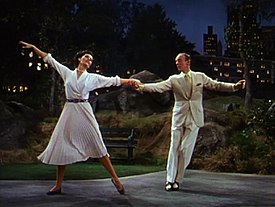
Back Melodies de Broadway Catalan The Band Wagon Welsh Vorhang auf! German واگن دسته موزیک Persian Iskelmäkaruselli Finnish Tous en scène (film, 1953) French קרון הלהקה HE Tous en scène (fim, 1953) HT The Band Wagon ID Spettacolo di varietà Italian
| The Band Wagon | |
|---|---|
 Theatrical release poster | |
| Directed by | Vincente Minnelli |
| Written by | |
| Produced by | Arthur Freed |
| Starring | |
| Cinematography | Harry Jackson |
| Edited by | Albert Akst |
| Music by | |
| Color process | Technicolor |
Production company | |
| Distributed by | Loew's, Inc |
Release date |
|
Running time | 111 minutes |
| Country | United States |
| Language | English |
| Budget | $2.9 million[1] |
| Box office | $3.5 million[1] |

The Band Wagon is a 1953 American musical romantic comedy film directed by Vincente Minnelli, starring Fred Astaire and Cyd Charisse. It tells the story of an aging musical star who hopes a Broadway show will revive his career. However, the play's director wants to make it a pretentious retelling of the Faust legend and brings in a prima ballerina who clashes with the star. Along with An American in Paris (1951) and Singin' in the Rain (1952), it is regarded as one of the finest Metro-Goldwyn-Mayer musicals, although it was a box-office disappointment on first release.
The songs were written by the team of composer Arthur Schwartz and lyricist Howard Dietz. Schwartz was a prolific Hollywood composer who teamed with numerous lyricists over the years, while Dietz, a studio publicist, generally collaborated with Schwartz. Some of the songs in the film had been created for the original 1931 Broadway musical by Schwartz and Dietz, also titled The Band Wagon, with a book by George S. Kaufman and starring Fred Astaire and his sister Adele. The movie's dances and musical numbers were staged by Michael Kidd.
The song "That's Entertainment!", which Schwartz and Dietz wrote specifically for the film, was a hit and has become a standard in popular music. Another song orchestrated by Conrad Salinger, "Dancing in the Dark", is considered part of the Great American Songbook and was from the original Broadway production. Astaire's early number in the film, "A Shine on Your Shoes", was written for a 1932 Broadway revue with music and lyrics by Dietz and Schwartz titled Flying Colors. (It was originally performed by the dancing team of Buddy and Vilma Ebsen). In the film version of The Band Wagon, the song was reworked as a specialty number by jazz arranger Skip Martin to showcase all of Astaire's musical talents.[2]
The musical director was Adolph Deutsch and the production was designed by Oliver Smith working for the first time in motion pictures. The film was nominated for Academy Awards for Best Costume Design, Color, Best Music, Scoring of a Musical Picture and Best Writing, Story and Screenplay.
Screenwriters Betty Comden and Adolph Green, who received the nomination for the screenplay, patterned the film's characters Lester and Lily Marton after themselves; however, the fictional characters were a married couple, and Comden and Green were not romantically involved. The character of an overachieving impresario was developed with the successful producer-director-actor José Ferrer in mind.[3]
In 1995, The Band Wagon was selected for preservation in the United States National Film Registry by the Library of Congress as being "culturally, historically, or aesthetically significant".[4] In 2006, this film ranked number 17 on the American Film Institute's list of best musicals.
- ^ a b The Eddie Mannix Ledger, Los Angeles: Margaret Herrick Library, Center for Motion Picture Study
- ^ Fordin 1996, p. 409.
- ^ Fordin 1996, p. 401.
- ^ "Complete National Film Registry Listing". Library of Congress. Retrieved September 16, 2020.